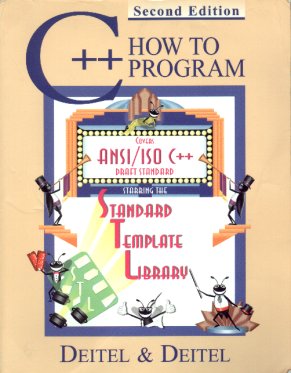Data Structures
CSC 460
Spring 2001
Saint Augustine's College
Instructor: Albert L. Crawford
Office: Cheshire 118
Office Hours: MWF 9:00am to 11:00am, MW 3:00pm to 4:00pm
E-mail: albert@CrawfordEnterprise.com
Web page: http://www.CrawfordEnterprise.com
Text: " C++ How To Program" by H.M. Deitel and P.J. Deitel
Course Description:
This course deals with the basic concepts of data representation
and structures such as lists, treens, strings, arrays, stacks, queues,and
algorithms for searching and sorting, using a high level language.
Course Goals and Objectives
-
Use and understand the insert sort and binary sort
-
Be able to read and write to text files.
-
Understand the concept of pointers
-
Understand the concepts of strings in C++
-
Be able to use and understand the quick sort and the heap sort
-
Understand the concept of classes
-
Be able to implement a linked list classes, including stacks and queues
-
Be able to implement a binary tree class.
Course Schedule:
-
Week 1 -- Review of C++
-
Weeks 2 to 4 -- Arrays, insert sort, bubble sort, binary search
-
Weeks 5 & 6 -- Pointers and Strings, basic file I/O
-
Week 7 -- Templates
-
Week 8, 9 -- Quick sort, Heap sort
-
Week 10 -- classes
-
Week 11 to 13 -- linked list class
-
Week 14 -- binary tree
-
Week 15 -- review
Final Examination
Programming Assignments
Grading and Testing
-
Notebook and oral exam: Each student will keep a notebook.
This notebook will include class notes from each class plus homework done
outside of class to assure that the student understands the lessons ofeach
class period. Prior to each major examination each student willmake
an appointment with the instructor for an oral examination and a reviewof
their notebook. This review will be weighted at 33 points each.
-
Programming Assignments: Students will be required to do severalprogrammingassignments
throughout the semester. Any assignment notturned inand correctly
working by the due date will receive a score of zero. The weight of each
assignment will be determined by the instructor.
-
Quizzes: There will be several in class quizzes given throughout
the semester. These will be weighted from 0 to 20 points each. These maybe
either announced or unannounced. No make ups will be given for quizzes.
If you miss a quiz your grade will be zero for that quiz.
-
Written Exams: There will be three regular hour exams during thesemester.These
exams will be weighted at 100 points each.
-
Final Examination: The final examination will be weighted at 200pointsand
will cover the material from the entire course.
-
Grades: Counting each major exam written exam as one grade each,thefinal
exam as two grades, and the oral exams as one grade, the lowest gradeof
the six grades the student earns will be dropped. Quizzeswill not
be dropped nor may they be made up. Homework assignmentswillnot be
dropped. All grades will be based on a 90, 80, 70, 60percentageof
all points for grades of A, B, C, and D. Any "curves" thatwill be placedon
the grades will be made on the individual tests and notat the end ofthe
semester. Such curves are not likely.
Course Policies
-
Attendance: You are expected to attend class. Any unexcused absenceisconsidered
excessive. If such absences reaches three or more the studentwillreceive
a half of a letter grade reduction for each absence beyond two.Attendance
will be taken at the beginning of each class.
-
Late for Class: If a student is late for class (arriving after therolehas
been taken) he/she must notify the instructor at the end of theclassperiod.
If the student fails to give the instructor proper notificationthis will
be counted as an unexcused absence. Underany event, beinglate will
be treated as an absence and the rules for makeupof work apply. Normally
the first one or two times a student is latefor class will becounted as
an excused absence, but if a student is regularly late thesewill be counted
as unexcused absences.
-
Leaving Class: If a student leaves the class for any reason,heor
she may not return to class. This will be considered an absence.
-
Makeup of work: If a student misses a class, or part of aclass,
for any reason he/she must make an appointment with the instructorto makesure
that the student has properly made up the work missed. This will
include the completition of the notebook for the days missed. During this
appointment it will be determined if the absence is excusedorunexcused.
If this appointment is not made and kept the absencewillautomatically be
considered unexcused.
-
Make ups for missed regular exams: The first major examination missed,forany
reason, will be the one that is dropped. The non-attendance willbe
treated as any other absence. If the student misses morethan onemajor
examination the instructor may allow the student to makeup the exam in
a manner determined by the instructor. In any case,ifthe absence
for any exam is unexcused no exam may be made up, even if thatabsence isexcused.
Students
who know ahead of time that theywill miss anexam for a good reason, such
as the participation in an officialschoolactivity, must notify the instructor
at least one week prior tothe exam.They will take the exam at the instructors
discretion,probably prior theirleave from school.
-
Cheating: I do not expect this paragraph to apply to anyone. However,inthe
very unlikely event that a student is caught cheating please seethestudent
handbook for the penalties that the instructor has the authority to apply.
-
Noise making devices: Students may not have in class any devicethatmay
disrupt the class. This includes, but is not limited to,cellphones
that are turned on and alarms on watches.
Note: The above syllabus is subject to change at the instructor's
discretion
